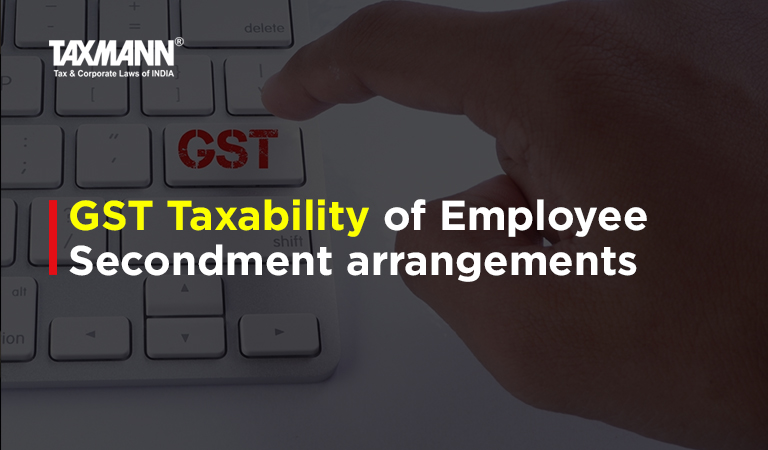GST Taxability of Employee Secondment arrangements
- Blog|News|GST & Customs|
- 3 Min Read
- By Taxmann
- |
- Last Updated on 7 June, 2022

Shaubhik Gupta – [2022] 139 taxmann.com 108 (Article)
Introduction
In a typical secondment arrangement employees of overseas entities (employer(s)) are deployed or deputed to the Indian entity on its request to meet the requirements and specific needs of the Indian entity.
Even during the term of secondment, the seconded employees remain on the payroll of the employer. The Indian entity usually exercises control and supervision over the seconded employees during the term of secondment. The Indian entity fulfils the labour laws and income tax TDS compliance with respect to the seconded employees during the tenure of secondment. The salary, other benefits of the seconded employees are paid by the employer to the employee. The employer claims the reimbursement of the said salary and benefits from the Indian entity on actuals and there is no mark-up on the said reimbursements.
Under the erstwhile service tax law the abovementioned arrangements were considered liable to service tax by the tax authorities. The tax authorities were of the view that such deployment of employees by employer to Indian entity is nothing but ‘supply of manpower service’ and reimbursement made by the Indian entity was the consideration for the service. However, in most of the cases the demand was disputed by the assessee and the disputes were usually settled by the decisions of the tribunal (CESTAT). The tribunal considered the facts of each case, in most cases held that the relationship between the employee and Indian entity was that of employee-employer, as among other things, the control and supervision over the employee was exercised by the Indian entity and employer has no such control over the employee. Therefore, tribunal in most cases concluded that there was no ‘manpower supply service’ provided by the employee to the Indian entity and the mode of disbursement of salary and benefits could not determine the nature of transaction.
Most of the appeals by the tax authorities, against the decisions of the tribunal, had been rejected by the Supreme Court. However, recently, one such dispute involving secondment arrangement was adjudicated by a larger bench of the Supreme Court in case of C.C.,C.E. & S.T. – Bangalore (Adjudication) v. Northern Operating Systems Pvt Ltd.
Brief Facts
Northern Operating Systems Pvt. Ltd. (the Respondent), entered into agreements with its overseas group entities (group entity/entities), under which the group entity deployed managerial and technical personnel (seconded employee(s)) to assist in business of the Respondent and accordingly the said employees were selected by the group entities and they would be deployed to the Respondent. Under the agreement, the seconded employees:
-
- had to devote their entire time and work to the Respondent and act according to the instructions and directions of the Respondent;
- remained on the payroll of the group entities for the purpose of social security/retirement benefits, however for all practical purposes, the Respondent was the employer for the seconded employees;
- received their salary, bonus, social benefits, out of pocket expenses and other expenses from the group entity;
An employment letter was issued to the seconded employees by the Respondent. The group entity raised debit note(s) on the Respondent to recover the expenses of salary, bonus etc. and the Respondent reimbursed all the expenses to the group entity. There was no mark-up on such reimbursement.
Issue before Supreme Court
The Supreme Court was required to determine as to whether the secondment of employees by group entities to Respondent, for the purpose of completion of Respondent’s job amounted to manpower supply service/service under the Act and thus liable to service tax.
Click Here To Read The Full Article
Disclaimer: The content/information published on the website is only for general information of the user and shall not be construed as legal advice. While the Taxmann has exercised reasonable efforts to ensure the veracity of information/content published, Taxmann shall be under no liability in any manner whatsoever for incorrect information, if any.

Taxmann Publications has a dedicated in-house Research & Editorial Team. This team consists of a team of Chartered Accountants, Company Secretaries, and Lawyers. This team works under the guidance and supervision of editor-in-chief Mr Rakesh Bhargava.
The Research and Editorial Team is responsible for developing reliable and accurate content for the readers. The team follows the six-sigma approach to achieve the benchmark of zero error in its publications and research platforms. The team ensures that the following publication guidelines are thoroughly followed while developing the content:
- The statutory material is obtained only from the authorized and reliable sources
- All the latest developments in the judicial and legislative fields are covered
- Prepare the analytical write-ups on current, controversial, and important issues to help the readers to understand the concept and its implications
- Every content published by Taxmann is complete, accurate and lucid
- All evidence-based statements are supported with proper reference to Section, Circular No., Notification No. or citations
- The golden rules of grammar, style and consistency are thoroughly followed
- Font and size that’s easy to read and remain consistent across all imprint and digital publications are applied



 CA | CS | CMA
CA | CS | CMA
